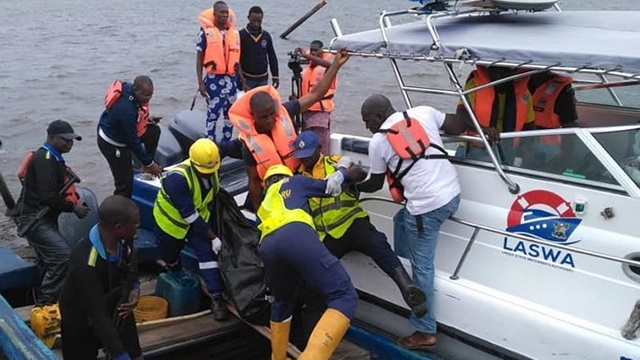
The frequent boat mishaps in the coastal and inland waterways have caused significant loss of humanlives and property. Between May and November this year, nothing less than 13 accidents have been recordedwith casualty figure put at371 lives. GBENGA AKINFENWA interrogates reasons for this and what government and sector players need to do to tame the monster.
For now, the fear of boats mishaps appears to be the beginning of wisdom for lovers of water transportation going by the trend of accidents recorded in the country’s waterways in the last few months.
In the last five months, water transportation had seen a remarkable boost in patronage, as many consider it as an alternative mode of transportation owing to the high cost of road transportation occasioned by the removal of fuel subsidy, as it is far cheaper and affordable.
Another factor fuelling patronage of transport by boat, according to investigations, is the pitiable and poorly-maintained state of the country’s roads, which have sent many to their early graves, coupled with the intention of avoiding the risk of abductions by armed gangs on the highways.
Unfortunately, this loved mean of transportation has become a serious albatross to passengers in recent time as incessant accidents have become the order of the day.
The Guardian learnt that in the last seven months – May to November– at least 371 deaths have been recorded in boat mishaps across the country.
Just last Monday, more than 20 people lost their lives in a boat accident that occurred around Anyiin, River Benue, in Taraba State. The accident happened barely two weeks after over 70 casualties were recorded in a boat that capsized in the Karim-Lamido Local Council of the state.
However, the most tragicwas recorded in Kwara State on June 12, 2023, leaving at least 108 people, who attended a wedding ceremony in Pategi area of the state dead.
The accident happened when a vessel conveying them capsized and split into two. It was learnt that the victims initially came on motorcycles, but were stranded due to heavy rain that flooded the main road leading out of the wedding venue.
Just 14 days after the Kwara accident, June 26 to be precise, three students – two male and one female –who were in Calabar, Cross River State, for medical students’ games drowned while on a boat cruise at Marina Resort when the facility capsized.
They were initially declared missing when 11 others were rescued on Saturday, but their bodies were recovered on Monday.Before this period, in May, a boat, heading to Dundeji village in Sokoto State, capsized, killing 15 people. The victims, who were majorly children, were on their way to fetch firewood. There were 36 passengers on board the boat, 21 of them were rescued, while 13 females and two males died.
Still in May, eight people lost their lives in a boat accident that occurred in Gusau, Zamfara State. The victims – a woman and seven children, were on a mission to fetch water in a river close to Gusau when the canoe capsized.
Five traders drowned in a boat mishap in Ugbo-Nla, Ilaje Council, Ondo State, on June 11, when their boat capsized. On August 24, a total of 12 people died in another boat accident at a river, Kogi KungraKamfani, in Arikiya, Lafia Council of Nasarawa State. It was gathered that 19 people were on board, while 12 died, seven were rescued.
In Adamawa State, at least 26 deaths were recorded within 72 hours early September. While 15 persons drowned in a lake after a boat conveying passengers, including children, capsized on September 9, casualty figure of 11 deaths were recorded on September 11 when a boat crashed in Kwatan Mallam Adamu in Gurin village, Fufore local council of the state.
On September 10, a total of 30 people – women and children died, while over 30 people were rescued in a boat accident in the Mokwa local council area of Niger State.
On October 2, eight people lost their lives in boat mishap in Yauri, Kebbi State, while nine people were rescued. Though media reports have it that over 40 people were on board with the claim that over 23 people drowned but the National Inland Waterways Authority (NIWA) said the accident involved only 17 persons.
In Lagos, two persons drowned in October when a boat crossing from Olorunsogo to Isawo capsized, while four others were rescued.In Taraba State, on October 29, 2023, over 32 people died, while 61 bodies were declared missing after a boat conveying over 100 people across the stretch of River Benue in Karim Lamido local council capsized.
Though data had shown that Lagos, Niger, Sokoto, and Kebbi states are susceptible to experiencing boat accidents almost yearly, boat mishapshave become a recurring decimal in the country’s rivers in recent years.Within the last seven months alone, at least, 13 different boat accidents have occurred, while others have remained either underreported or unreported.
A marine engineer based in Lokoja, Kogi State, Tammy Fiberesima, who disclosed that the domestic ferry scheme has contributed largely to the socio-economic well-being of the nation, lamented that the unpleasant circumstances facing the sector was caused by many challenges. He listed forms of accidents on the waterways to include – capsizing, grounding, flooding, swamping, sinking, fire explosion, electrocution, collision with another vessel, collision with a foreign object, asphyxiation, persons or person falls within or overboard a vessel, and person or persons ejected from a vessel, among others.
Fiberesima attributed the cause of the accidents to issues concerning the vessel, the operator, and the operating environment – unsafe acts, unsafe conditions, and combination of both. “For unsafe acts, these include: over speeding, and lacking appropriate operating know-how. For unsafe conditions, these include: unhealthy weather, and vessel hazardous defects.
“These unsafe acts and unsafe conditions caused incessant boats mishaps on Nigerian inland waterways, resulting to: loss of lives, loss of properties, major/minor injuries, loss of earnings, pains and suffering, loss of skills, production losses, increased insurance costs, lowered crew/passengers morale, and others.”
According to a study, a total of 2,346 liveswere lost to 266 causalities of boat accidents between 2010 to October 2021. The highest number of fatalities was recorded in 2021. That year, the country experienced two major boating accidents. In May, a ship carrying 160 passengers aboard ultimately left at least 98 dead, and another in November resulted in 76 deaths.
Last year, about 76 people lost their lives in Anambra State, when a boat carrying 85 passengers from Onukwu to NkwoOgbakugba, Ogbaru local council capsized.
For now, the operators and sector players appear to be in dilemma as the blame game seems to be the order of the day; even the government is reportedly helpless on strategies to reverse the untold trend, which experts described as man-made.
Findings show that the incessant boat mishaps and other challenges facing the sector is majorly attributed to lack of safety mechanisms, non-adherence to safety guidelines, dearth of life-saving equipment and others.
In a study, titled: Trend Analysis of Boat Accidents and Causes in the Waterways of Nigeria, Dr. C.U. Akpudo attributed major cause of the boat accidents to human-related factors, “which accounts for 67.21 per cent, followed by natural factors 22.13 per cent.” He indicated that passenger boats – 52.46 per cent and Cargo boats – 14.21 per cent are the highest boat types responsible for accidents in Nigeria waterways.
Human related factors – overloading, collision, piracy and over-speeding, are the major causes of boat accidents along the coastal and inland waterways of Nigeria, followed by natural factors. The natural factors include flooding, poor visibility, shallow draught, stability failure, storm/wind, and underwater debris.
The Guardian learnt that aside from laxity of safety regulations, lack of life vests, overloading, and poor ship maintenance, which often lead to fatal boating incidents, some operators engage in night time sailing, despite being outlawed by government.
In his submission, Fiberesima, who attributed the problem facing the sector largely to unpreparedness of the country on how to manage the waterways, said several recommendations have been proffered to government, but nothing seems to be working due to lack of synergy among the operators.
He said: “The issue is that we have not prepared for boating activities for a long time. In the past, there were much boating activities but less incessant boat mishaps, this is because most of the riverine communities are only accessed by water. We have proffered several recommendations but they are not working, this is because the waterways is not only meant for navigation, it’s not only NIWA that has right for the usage, we have the Electricity Board, and so many others, so there’s no synergy at all and so much man-made problems like de-vegetation of our banks, especially in the northern part of the country.
“This is a major issue, in the sense that when de-vegetation slides into the water, what we are going to experience will not be pleasant. There are three types of problems caused by de-vegetation – the one that floats on our water ways – it’s not dangerous because with the waves, they’ll go to the sides; the one that is totally submerged, there is not going to be a navigational problem, but they are going to cause environmental problem; then, the ones that are semi-submerged, beneath the surface of the water are the dangerous one that if our canoe climb on it with loads they’ll slip, people look at it as spiritual, it’s not spiritual. So, there is need for synergy between agencies that have right to the usage of the waterways.”
Fiberesima, who noted that based on the record via field surveys’ submissions, said boats mishaps are majorly caused by drug and alcohol use, operator’s inexperience, or lack of concentration, reckless operation, over-speeding, hazardous condition(such as bad weather), machinery failure, and failure in manoeuvring, among others.
A boat driver, operating along the Isawo axis, Lagos, Jacob Olumide, who corroborated Fiberesima’s position, added that inexperience of boat captains is the leading cause of boat accidents in the country because some of the captains drive boats to make ends meet without knowing the rules and regulations guiding it.
He added that the agencies responsible for monitoring their activities in states that engage in water transportation must introduce a boating education class for the Association of Ferry Operators.
“Boating laws and regulations, navigation rules, knot tying and what to do in a weather-related emergency are topics that must be included in the training. Going forward, taking the course must be made mandatory before any ferry operator can legally operate on the waterways. Operators must pay attention to what matters. They must always be reminded that boats do not have brakes. There should be regular maintenance of the boat. Boat owners must cultivate the habit of regular maintenance of their boats and must ensure that the navigation lights are working perfectly.
“Boat captains should be educated on riding excessive speed boats because they are bigger and faster. Overloading should not be allowed and boat captains must always check the manufacturer’s capacity plate for the maximum weight or number of individuals their boats can safely carry on board,” he said.
A regular passenger, Jonah Aigbor, revealed that most of the boat captains do not possess a valid licence. While calling for proper monitoring of the sector, he said most times the captainsdrive recklessly without being cautious of other people’s lives on the boat.
“NIWA and other agencies should ensure that there is a database for the records of qualified boat drivers and those are the ones that should be allowed to operate and not the other way round. In addition, these agencies should make sure all rickety boats are taken off the waterways and new boats should be bought.
“Government should encourage boat builders to do more so we can have good boats to last for years. Also, boat operators and commuters should be advised to always be in their live jacket before any trip is made and anyone who does not make use of it should not be allowed in. All these laws must be enforced by the agencies in order to curb boat mishaps.”
He said: “I discovered that there is dislocation in some of the duties of NIWA, when it was bearing Inland Waterways Department (IWT) and now. In the past, NIWA used to have a unit to address some of the obstruction on the waterways, but some of these policies of government have affected their duties.
“Let me give you an example, if you see the old pictures of waterways transportation in the rural areas, you’ll see metal gallons always tied at the superstructure of the wooden boats, do you know the purpose they serve? That is the life jacket. During their period, they manage their resources.
“When we talk about the causes of these problems, we can group it in two forms – the players (operators) and the status of our channel – sharp bent, rock, obstructions, inadequate channels and others. We have the issue of condition of our boats. For example, the wooden boat that is common in the North, you won’t believe that some have used it for last five years, we have issue of poverty.
“We have the same terrain with Indonesia and Sri Lanka –third world countries– they use chemicals to prolong the life of their boats. The permanent solution is to phase off these types of wood boats and replace them with fibre boats. Majorly, our problem is operators’ incompetency and violation of safety rules.”
To stop the incessant boat mishap trend, Fiberesima suggested: “Firstly, define the problem, including the examination of the existing proffered solutions, not effectively working; fixing the unsafe, or hazardous, conditions of waterways; and checking for suitability of boats that are plying our waterways.”
He suggested adequate preparation for boating activities. “For example, fishing out all obstructions, certifying operators competency, and ensuring the compliance to standard safety rules, and check weather and water conditions, and putting measures to overcome poor funding to adequate boat maintenance and installation of safety gadgets and avoiding shortage of boats during peak season.
“Having and operating well-cut standards for inspection, surveillance, control and enforcement, coordinated controlled usage of our waterways by relevant agencies and introduction and usage of verified technologies.”
The Nigeria Inland Waterways Authority (NIWA) has attributed the incessant mishaps to non-compliance of passengers and boat operators, identifying overloading and lack of safety compliance, especially in the northern region as major causes.
NIWA’s spokesperson, Jibril Darda’u, said the authority is taking measures to construct three open boats in the northern regions, to mitigate overloading and enhance safety. He noted that NIWA is planning to engage Governors and lawmakers in the affected areas to include boat construction as part of their constituency projects, thereby reducing boat accidents, especially in rural areas.
He added that the authority will persist in raising awareness about the importance of safety measures in boat travel, including promoting life jacket usage. “NIWA has observed that passengers in many rural areas do not use life jackets despite being provided with them.”
In the wake of the worrisome development, President Bola Tinubu has directed various government agencies, including law enforcement, maritime safety and transportation safety authorities, to collaborate closely in identifying the root causes of the unfortunate and preventable disasters.
The President, who gave the order, in a statement signed by his Special Adviser on Media and Publicity, AjuriNgelale, said: “President Tinubu demands a thorough and comprehensive investigation into the recurring tragedy of fatal boat incidents across the nation.”
The President stressed his commitment to holding government agencies accountable for any regulatory or safety lapses and instructed a comprehensive review of safety measures and strict enforcement of existing laws on boating activities in the country.
Fiberesima, however, lamented that some of the reasons why intervention of government is not working is due to the fact that the country lacked adequate boats, siphoning of palliatives, poverty and lack of synergy between the operators and boat drivers among others.
“Government bodies and non-governmental organisations usually give life jackets to these boat operators, but it hardly get to them. There is no synergy between the operators and boat drivers, most times the regulators blame the boat drivers, saying they are not putting on life jacket, who wants to die? And to have the standard life jacket, they cannot afford it, then the life jackets given to them are most times dirty that passengers will not be willing to use them,” he said.






